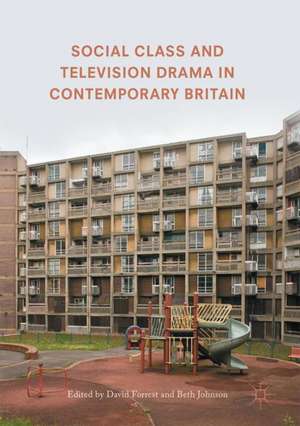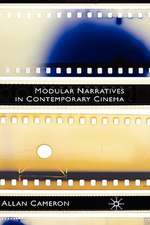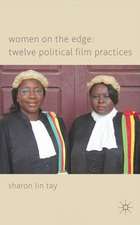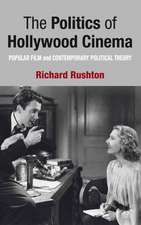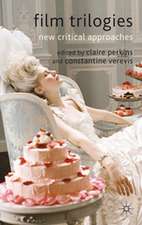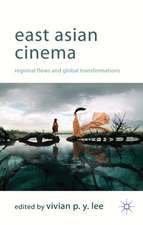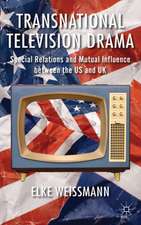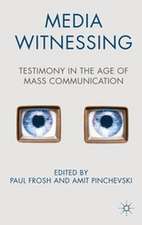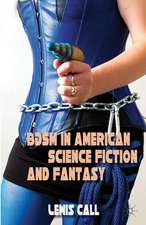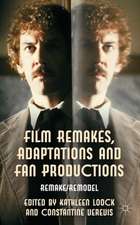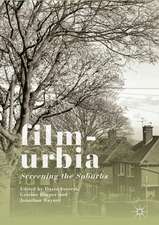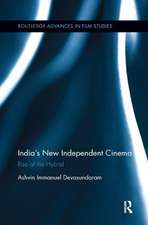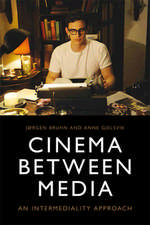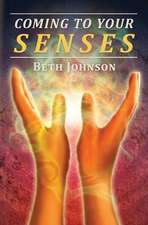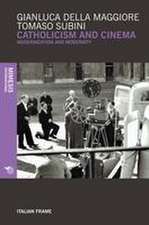Social Class and Television Drama in Contemporary Britain
Editat de David Forrest, Beth Johnsonen Limba Engleză Hardback – 29 iun 2017
Preț: 951.59 lei
Preț vechi: 1160.48 lei
-18% Nou
Puncte Express: 1427
Preț estimativ în valută:
182.12€ • 189.63$ • 153.91£
182.12€ • 189.63$ • 153.91£
Carte tipărită la comandă
Livrare economică 10-24 martie
Preluare comenzi: 021 569.72.76
Specificații
ISBN-13: 9781137555052
ISBN-10: 113755505X
Pagini: 295
Ilustrații: XVII, 271 p. 6 illus. in color.
Dimensiuni: 148 x 210 mm
Greutate: 0.62 kg
Ediția:1st ed. 2017
Editura: Palgrave Macmillan UK
Colecția Palgrave Macmillan
Locul publicării:London, United Kingdom
ISBN-10: 113755505X
Pagini: 295
Ilustrații: XVII, 271 p. 6 illus. in color.
Dimensiuni: 148 x 210 mm
Greutate: 0.62 kg
Ediția:1st ed. 2017
Editura: Palgrave Macmillan UK
Colecția Palgrave Macmillan
Locul publicării:London, United Kingdom
Cuprins
1. Introduction (David Forrest and Beth Johnson).- Part I: Authorship and Class - 2. Beth Johnson (The University of Leeds) – This is England: Authorship, Critical Contexts and Class Telly.- 3. David Forrest (The University of Sheffield) – Jimmy McGovern’s The Street and the Politics of Everyday Life.- 4. Stephen Harper (The University of Portsmouth) - High-flyers, Hooligans and Helpmates: Images of Social Class in the Television Dramas of Stephen Poliakoff.- Part II: Institutions and Structures of Class - 5. Paul Elliott (University of Worcester) - Through Class Darkly: Class in the British TV Noir.- 6. Felicity Colman and David James (Manchester Metropolitan University) - Military Class: Hearts and Minds on the Domestic Screen.- 7. Gill Jamieson (University of the West of Scotland) - Creating a Level Playing Field: ‘Honest Endeavour Together!’: Social Mobility, Entrepreneurialism and Class in Mr Selfridge.- 8. James Dalby (Universityof Gloucestershire) - Social Class and Television Audiences in the 1990s.- 9. HollyGale Millette (The University of Southampton) - Searching for Hugh Gaitskell in a Neoliberal Landscape – Masculinities and Class Mobility in Goodnight Sweetheart.- Part III: Place and Class - 10. James Leggott (Northumbria University) - From Newcastle to Nashville: The Northern Soul of Jimmy Nail.- 11. Het Phillips (University of Birmingham) - ‘A Woman Like That Is Not A Woman, Quite. I Have Been Her Kind’: Maxine Peake and the Gothic Excess of Northern Femininity.- 12. Paul Long (Birmingham City University) – Class, Place and History in the Imaginative Landscapes of Peaky Blinders.- 13. Helen Piper (University of Bristol) - Happy Valley: Compassion, evil and exploitation in an ordinary ‘trouble town’.- Part IV: Taste and Class - 14. Phil Wickham (University of Exeter) - 21st Century British Sitcom and “the Hidden Injuries of Class”.- 15. Chris Pallant and James Newton (Canterbury Christchurch University) - Animating Class in Contemporary British Television.- 16. Antony Mullen (Durham University) - Public Property: Celebrity and the Politics of New Labour in Footballers’ Wives.- 17. Sue Vice (The University of Sheffield) - Grandma’s House and the Charms of the Petit-Bourgeoisie.
Recenzii
“Rather than homogenise class’s meaning, the editors open the collection up to considering how television constructs its own images of class. Class is approached as a dynamic issue, present as an overt object of representation as well as a set of ideological positions which shape television’s visual address.” (Daniel Martin, Critical Studies in Television, Vol. 14 (4), September, 2019)
“The authors here adopt a variety of critical approaches that, while alive to the importance in itself of class visibility in contemporary television, are also alert to the problematic discourses it sometimes generates. … This is an indispensable book for anyone wanting to know more about recent British television drama, and why it remains an important subject of study.” (Neil Archer, cercles.com, July)
Notă biografică
David Forrest is Senior Lecturer in Film Studies at the University of Sheffield, UK. He is the author of Social Realism: Art, Nationhood and Politics (2013), co-editor of Filmurbia: Screening The Suburbs (2017) with Graeme Harper and Jonathan Rayner, and is currently at work on a book entitled New Realisms: Contemporary British Cinema.
Beth Johnson is Associate Professor of Film and Media at the University of Leeds, UK. Her publications include Paul Abbott (2013) and alongside David Forrest she recently co-edited a dossier on ‘Northern English Stardom’ in The Journal of Popular Television (4/2, 2016).
Textul de pe ultima copertă
A rich and nuanced approach to class and its mediation through contemporary British television drama, this collection responds to the precarity that circulates and constricts in ‘Austerity Britain’, pre- and post-Brexit. The book self-consciously eschews obvious class-bound texts such as Shameless and Downton Abbey, offering fresh perspectives and insights on popular programmes such as This is England and Happy Valley. Although class is a central theme, the contributors also draw on theoretical work on emotion, gender and ethnicity.
- - Kristyn Gorton, University of York, UK.
This collection is a wide-ranging exploration of contemporary British television drama and its representations of social class. Through early studio-set plays, soap operas and period drama, the volume demonstrates how class provides a bridge across multiple genres and traditions of television drama. The authors tracethis thematic emphasis into the present day, offering fascinating new insights into the national conversation around class and identity in Britain today. The chapters engage with a range of topics including authorial explorations of Stephen Poliakoff and Jimmy McGovern, case studies of television performers Maxine Peake and Jimmy Nail, and discussions of the sitcom genre and animation form. This book offers new perspectives on popular British television shows such as Goodnight Sweetheart and Footballers’ Wives, and analysis of more recent series such as Peaky Blinders and This is England. - - Kristyn Gorton, University of York, UK.
Caracteristici
This collection critically considers contemporary British television drama from 1997 to 2017 It provides thematic emphasis on class and new insights into the national conversation around class and identity in Britain today The chapters include authorially-inclined explorations, case-studies of television performers, discussions of television form, and analyses of critically lauded and popular television texts
